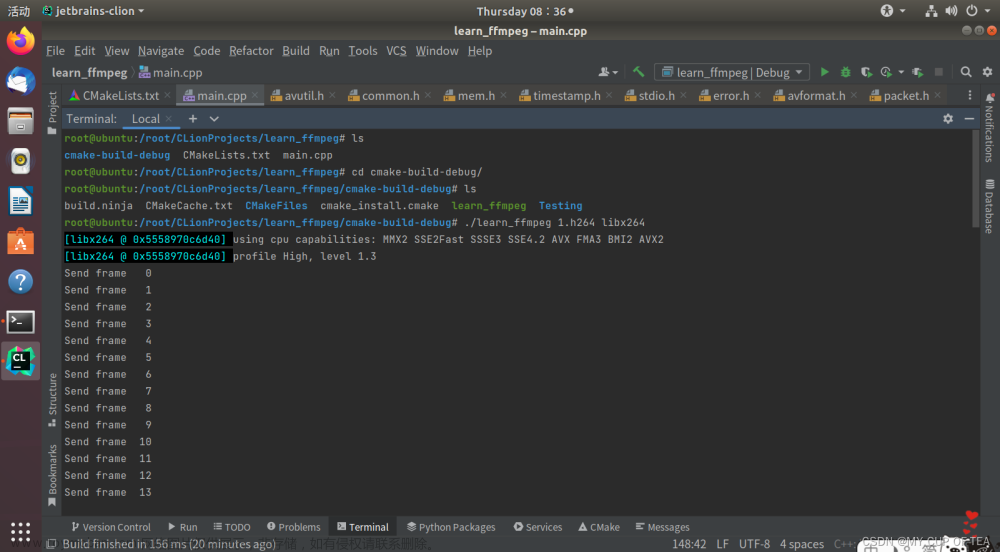1、写在前面
此文章主要包含解码H264视频流数据,主要有以下几点:
1、H264视频帧为Annex B格式,若使用AVCC格式可自行研究;
2、H264视频裸流,非解码视频文件(若有需要我后期可添加这部分代码);
3、支持输出RGB24或YUV420格式,其他可自行修改;
4、FFmpeg官网代码迭代及接口变更较大,代码适应于FFmpeg3.4.2"Cantor"、3.3.7"Hilbert"等版本,较旧接口请看旧版本代码;
2、新版本
FFmpegVideoDecoder.h
#include <libavcodec/avcodec.h>
/**
视频流解码器初始化
@param ctx 解码参数结构体AVCodecParameters
@see FFmpeg_H264DecoderInit,此为解码H264视频流
@return 初始化成功返回0,否则<0
*/
int FFmpeg_VideoDecoderInit(AVCodecParameters *ctx);
/**
H264视频流解码器初始化
@return 初始化成功返回0,否则<0
*/
int FFmpeg_H264DecoderInit(void);
/**
释放解码器
@return 初始化成功返回0,否则<0
*/
int FFmpeg_VideoDecoderRelease(void);
//return 0:暂未收到解码数据,-1:解码失败,1:解码成功
/**
解码视频流数据
@param inbuf 视频裸流数据
@param inbufSize 视频裸流数据大小
@param framePara 接收帧参数数组:{width,height,linesize1,linesiz2,linesize3}
@param outRGBBuf 输出RGB数据(若已申请内存)
@param outYUVBuf 输出YUV数据(若已申请内存)
@return 成功返回解码数据帧大小,否则<=0
*/
int FFmpeg_H264Decode(unsigned char * inbuf, int inbufSize, int *framePara, unsigned char *outRGBBuf, unsigned char **outYUVBuf);FFmpegVideoDecoder.c
#include <libavformat/avformat.h>
#include <libswscale/swscale.h>
#include "FFmpegVideoDecoder.h"
struct AVCodecContext *pAVCodecCtx_decoder = NULL;
struct AVCodec *pAVCodec_decoder;
struct AVPacket mAVPacket_decoder;
struct AVFrame *pAVFrame_decoder = NULL;
struct SwsContext* pImageConvertCtx_decoder = NULL;
struct AVFrame *pFrameYUV_decoder = NULL;
int FFmpeg_VideoDecoderInit(AVCodecParameters *codecParameters)
{
if (!codecParameters) {
CPrintf("Source codec context is NULL."); //CPrintf需替换为printf
return -1;
}
FFmpeg_VideoDecoderRelease();
avcodec_register_all();
pAVCodec_decoder = avcodec_find_decoder(codecParameters->codec_id);
if (!pAVCodec_decoder) {
CPrintf1("Can not find codec:%d\n", codecParameters->codec_id);
return -2;
}
pAVCodecCtx_decoder = avcodec_alloc_context3(pAVCodec_decoder);
if (!pAVCodecCtx_decoder) {
CPrintf("Failed to alloc codec context.");
FFmpeg_VideoDecoderRelease();
return -3;
}
if (avcodec_parameters_to_context(pAVCodecCtx_decoder, codecParameters) < 0) {
CPrintf("Failed to copy avcodec parameters to codec context.");
FFmpeg_VideoDecoderRelease();
return -3;
}
if (avcodec_open2(pAVCodecCtx_decoder, pAVCodec_decoder, NULL) < 0){
CPrintf("Failed to open h264 decoder");
FFmpeg_VideoDecoderRelease();
return -4;
}
av_init_packet(&mAVPacket_decoder);
pAVFrame_decoder = av_frame_alloc();
pFrameYUV_decoder = av_frame_alloc();
return 0;
}
int FFmpeg_H264DecoderInit()
{
avcodec_register_all();
AVCodec *pAVCodec = avcodec_find_decoder(AV_CODEC_ID_H264);
if (!pAVCodec){
CPrintf("can not find H264 codec\n");
return -1;
}
AVCodecContext *pAVCodecCtx = avcodec_alloc_context3(pAVCodec);
if (pAVCodecCtx == NULL) {
CPrintf("Could not alloc video context!\n");
return -2;
}
AVCodecParameters *codecParameters = avcodec_parameters_alloc();
if (avcodec_parameters_from_context(codecParameters, pAVCodecCtx) < 0) {
CPrintf("Failed to copy avcodec parameters from codec context.");
avcodec_parameters_free(&codecParameters);
avcodec_free_context(&pAVCodecCtx);
return -3;
}
int ret = FFmpeg_VideoDecoderInit(codecParameters);
avcodec_parameters_free(&codecParameters);
avcodec_free_context(&pAVCodecCtx);
return ret;
}
int FFmpeg_VideoDecoderRelease() {
if (pAVCodecCtx_decoder != NULL) {
avcodec_free_context(&pAVCodecCtx_decoder);
pAVCodecCtx_decoder = NULL;
}
if (pAVFrame_decoder != NULL) {
av_packet_unref(&mAVPacket_decoder);
av_free(pAVFrame_decoder);
pAVFrame_decoder = NULL;
}
if (pFrameYUV_decoder) {
av_frame_unref(pFrameYUV_decoder);
av_free(pFrameYUV_decoder);
pFrameYUV_decoder = NULL;
}
if (pImageConvertCtx_decoder) {
sws_freeContext(pImageConvertCtx_decoder);
}
av_packet_unref(&mAVPacket_decoder);
return 0;
}
int FFmpeg_H264Decode(unsigned char *inbuf, int inbufSize, int *framePara, unsigned char *outRGBBuf, unsigned char **outYUVBuf)
{
if (!pAVCodecCtx_decoder || !pAVFrame_decoder || !inbuf || inbufSize<=0 || !framePara || (!outRGBBuf && !outYUVBuf)) {
return -1;
}
av_frame_unref(pAVFrame_decoder);
av_frame_unref(pFrameYUV_decoder);
framePara[0] = framePara[1] = 0;
mAVPacket_decoder.data = inbuf;
mAVPacket_decoder.size = inbufSize;
int ret = avcodec_send_packet(pAVCodecCtx_decoder, &mAVPacket_decoder);
if (ret == 0) {
ret = avcodec_receive_frame(pAVCodecCtx_decoder, pAVFrame_decoder);
if (ret == 0) {
framePara[0] = pAVFrame_decoder->width;
framePara[1] = pAVFrame_decoder->height;
if (outYUVBuf) {
*outYUVBuf = (unsigned char *)pAVFrame_decoder->data;
framePara[2] = pAVFrame_decoder->linesize[0];
framePara[3] = pAVFrame_decoder->linesize[1];
framePara[4] = pAVFrame_decoder->linesize[2];
} else if (outRGBBuf) {
pFrameYUV_decoder->data[0] = outRGBBuf;
pFrameYUV_decoder->data[1] = NULL;
pFrameYUV_decoder->data[2] = NULL;
pFrameYUV_decoder->data[3] = NULL;
int linesize[4] = { pAVCodecCtx_decoder->width * 3, pAVCodecCtx_decoder->height * 3, 0, 0 };
pImageConvertCtx_decoder = sws_getContext(pAVCodecCtx_decoder->width, pAVCodecCtx_decoder->height, AV_PIX_FMT_YUV420P, pAVCodecCtx_decoder->width, pAVCodecCtx_decoder->height, AV_PIX_FMT_RGB24, SWS_FAST_BILINEAR, NULL, NULL, NULL);
sws_scale(pImageConvertCtx_decoder, (const uint8_t* const *) pAVFrame_decoder->data, pAVFrame_decoder->linesize, 0, pAVCodecCtx_decoder->height, pFrameYUV_decoder->data, linesize);
sws_freeContext(pImageConvertCtx_decoder);
return 1;
}
} else if (ret == AVERROR(EAGAIN)) {
return 0;
} else {
return -1;
}
}
return 0;
}3、旧版本
FFmpegVideoDecoder.h
int FFmpeg_VideoDecoderInit(AVCodecContext *ctx);
int FFmpeg_H264DecoderInit(void);
int FFmpeg_VideoDecoderRelease(void);
int FFmpeg_H264Decode(unsigned char * inbuf, int inbufSize, int *framePara, unsigned char *outRGBBuf, unsigned char **outYUVBuf);FFmpegVideoDecoder.c
#include <libavformat/avformat.h>
#include <libswscale/swscale.h>
#include "FFmpegVideoDecoder.h"
struct AVCodecContext *pAVCodecCtx = NULL;
struct AVCodec *pAVCodec;
struct AVPacket mAVPacket;
struct AVFrame *pAVFrame = NULL;
struct SwsContext* pImageConvertCtx = NULL;
struct AVFrame *pFrameYUV = NULL;
int FFmpeg_VideoDecoderInit(AVCodecContext *ctx)
{
if (!ctx) {
cv_printf("Source codec context is NULL."); //cv_printf需替换为printf
return -1;
}
FFmpeg_VideoDecoderRelease();
avcodec_register_all();
pAVCodec = avcodec_find_decoder(ctx->codec_id);
if (!pAVCodec) {
cv_printf("Can not find codec:%d\n", ctx->codec_id);
return -2;
}
pAVCodecCtx = avcodec_alloc_context3(pAVCodec);
if (!pAVCodecCtx || avcodec_copy_context(pAVCodecCtx, ctx) != 0) {
cv_printf("Failed to alloc codec context.");
FFmpeg_VideoDecoderRelease();
return -3;
}
if (avcodec_open2(pAVCodecCtx, pAVCodec, NULL) < 0){
cv_printf("Failed to open h264 decoder");
FFmpeg_VideoDecoderRelease();
return -4;
}
av_init_packet(&mAVPacket);
pAVFrame = av_frame_alloc();
pFrameYUV = av_frame_alloc();
return 0;
}
int FFmpeg_H264DecoderInit()
{
avcodec_register_all();
AVCodec *pAVCodec = avcodec_find_decoder(AV_CODEC_ID_H264);
if (!pAVCodec){
cv_printf("can not find H264 codec\n");
return -1;
}
AVCodecContext *pAVCodecCtx = avcodec_alloc_context3(pAVCodec);
int ret = FFmpeg_VideoDecoderInit(pAVCodecCtx);
if (pAVCodecCtx || ret < 0) {
avcodec_free_context(&pAVCodecCtx);
pAVCodecCtx = NULL;
}
return ret;
}
int FFmpeg_VideoDecoderRelease() {
if (pAVCodecCtx != NULL) {
avcodec_close(pAVCodecCtx);
avcodec_free_context(&pAVCodecCtx);
pAVCodecCtx = NULL;
}
if (pAVFrame != NULL) {
av_packet_unref(&mAVPacket);
av_free(pAVFrame);
pAVFrame = NULL;
}
if (pFrameYUV) {
av_frame_unref(pFrameYUV);
av_free(pFrameYUV);
pFrameYUV = NULL;
}
if (pImageConvertCtx) {
sws_freeContext(pImageConvertCtx);
}
av_packet_unref(&mAVPacket);
return 0;
}
int FFmpeg_H264Decode(unsigned char * inbuf, int inbufSize, int *framePara, unsigned char *outRGBBuf, unsigned char **outYUVBuf)
{
av_frame_unref(pAVFrame);
av_frame_unref(pFrameYUV);
framePara[0] = framePara[1] = 0;
mAVPacket.data = inbuf;
mAVPacket.size = inbufSize;
if (inbuf==NULL || inbufSize<=0) {
return -1;
}
int len = -1, got_picture = 0;
len = avcodec_decode_video2(pAVCodecCtx, pAVFrame, &got_picture, &mAVPacket);
if (len < 0) {
cv_printf("解码错误:%d\n",len);
return len;
}
if (got_picture > 0) {
framePara[0] = pAVFrame->width;
framePara[1] = pAVFrame->height;
if (outYUVBuf) {
*outYUVBuf = (unsigned char *)pAVFrame->data;
framePara[2] = pAVFrame->linesize[0];
framePara[3] = pAVFrame->linesize[1];
framePara[4] = pAVFrame->linesize[2];
} else if (outRGBBuf) {
pFrameYUV->data[0] = outRGBBuf;
pFrameYUV->data[1] = NULL;
pFrameYUV->data[2] = NULL;
pFrameYUV->data[3] = NULL;
int linesize[4] = { pAVCodecCtx->width * 3, pAVCodecCtx->height * 3, 0, 0 };
pImageConvertCtx = sws_getContext(pAVCodecCtx->width, pAVCodecCtx->height, AV_PIX_FMT_YUV420P, pAVCodecCtx->width, pAVCodecCtx->height, AV_PIX_FMT_RGB24, SWS_FAST_BILINEAR, NULL, NULL, NULL);
sws_scale(pImageConvertCtx, (const uint8_t* const *) pAVFrame->data, pAVFrame->linesize, 0, pAVCodecCtx->height, pFrameYUV->data, linesize);
sws_freeContext(pImageConvertCtx);
}
}
return len;
}版权声明:本文为CSDN博主「W2Y」的原创文章,遵循CC 4.0 BY-SA版权协议,转载请附上原文出处链接及本声明。
原文链接:FFmpeg解码H264视频裸流(直接可用)-CSDN博客
★文末名片可以免费领取音视频开发学习资料,内容包括(FFmpeg ,webRTC ,rtmp ,hls ,rtsp ,ffplay ,srs)以及音视频学习路线图等等。
见下方!↓↓↓↓↓↓↓↓↓↓↓↓↓↓↓↓↓↓↓↓↓↓↓↓↓↓↓↓↓↓↓↓↓↓↓↓↓文章来源:https://www.toymoban.com/news/detail-858055.html
文章来源地址https://www.toymoban.com/news/detail-858055.html
到了这里,关于FFmpeg解码H264视频裸流(直接可用)的文章就介绍完了。如果您还想了解更多内容,请在右上角搜索TOY模板网以前的文章或继续浏览下面的相关文章,希望大家以后多多支持TOY模板网!










